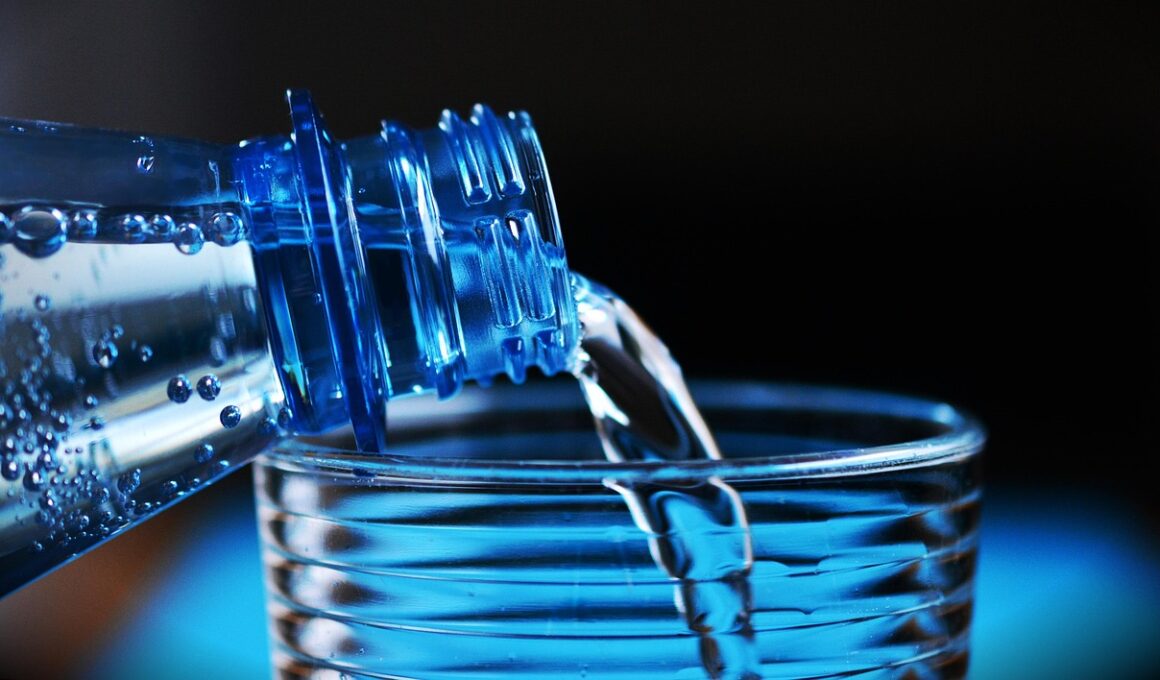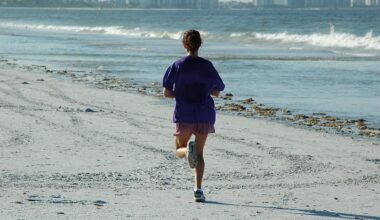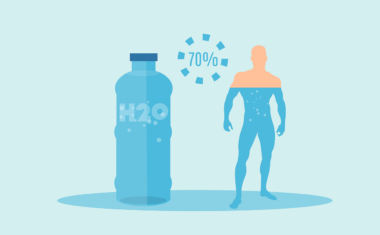How Dehydration Affects Muscle Function and Recovery
Dehydration can severely impact muscle function and recovery, influencing athletic performance and daily activities. When the body loses more fluids than it takes in, various physiological processes slow down. This deficiency may lead to fatigue, diminished strength, and reduced endurance levels. Furthermore, dehydration can cause cramping, overheating, and an increased risk of injuries during physical activities. Essentially, water plays an important role in maintaining muscle performance during both aerobic and anaerobic exercises. Muscle cells rely on hydration to function optimally, as fluids assist in the transport of nutrients and the removal of metabolic wastes. Additionally, dehydration can reduce blood plasma volume, altering circulation, and diminishing oxygen delivery to working muscles. This may lead to reduced exercise intensity and a quicker onset of fatigue. To combat these issues, it’s crucial to stay vigilant about hydration before, during, and after exercise. Incorporating water-rich foods and monitoring fluid intake can ensure that muscle function remains at its peak. Athletes should adopt personalized hydration plans tailored to their specific needs and environmental conditions to mitigate the adverse effects of dehydration.
Recognizing Signs of Dehydration
Recognizing the signs of dehydration early can significantly enhance muscle function and promote recovery. Symptoms can vary widely, but common indicators include thirst, dry mouth, and fatigue. When dehydration progresses, body temperature regulation may be compromised, leading to overheating during exercise. Additionally, a decrease in urine output, dark yellow urine, and dizziness may signal a critical need for hydration. Athletes should monitor these signs closely, especially during intense training or warm weather. Chronic dehydration can lead to detrimental consequences, including impaired cognitive function and mood changes. It has been observed that even mild dehydration can trigger increased perception of effort during exercise, making workouts feel harder. This affects the overall training experience, motivation levels, and subsequent muscle recovery. Adequate hydration may alleviate these symptoms, allowing for better focus and performance. Engaging in proper hydration strategies not only improves immediate exercise conditions but can also have lasting effects on overall health and fitness goals. Athletes are encouraged to establish routine hydration habits to maintain optimal fluid balance and ensure that they can perform at their best consistently. Regularly assessing hydration levels is critical to preventing complications.
Muscle recovery is inherently linked to hydration and nutrient replenishment post-exercise. After physical activity, muscles experience micro-tears that require repair facilitated by proper hydration. Fluid intake aids in the transportation of essential nutrients critical for muscle repair, such as electrolytes and proteins. Only with sufficient hydration can the body efficiently deliver these nutrients to the injured areas. Moreover, dehydration can lead to the accumulation of metabolic waste products, hindering the recovery process. Consuming fluids containing carbohydrates and electrolytes can enhance recovery further. Sports drinks or electrolyte-infused waters can be beneficial after rigorous workouts. These beverages not only replenish lost fluids but also replace vital minerals lost through sweat. In essence, adequate recovery from workouts depends greatly on rehydration strategies. A well-hydrated athlete is more likely to recover quickly and reduce post-exercise soreness. Implementing a balanced hydration schedule, including both water and electrolyte sources, offers significant advantages for recovery. Therefore, athletes should emphasize hydration as a primary component of their recovery routines. Neglecting hydration can lead to prolonged soreness and extended recovery periods, impacting overall performance in subsequent workouts and events.
The Role of Electrolytes in Hydration
Electrolytes play a vital role in hydration and muscle function, especially during intense physical activity. Key electrolytes such as sodium, potassium, and magnesium help maintain fluid balance in cells. They also support nerve function, muscle contractions, and overall cardiovascular health. As we sweat, our bodies lose not only water but also essential electrolytes, which can disrupt muscle performance if not restored. Therefore, athletes must prioritize replenishing these electrolytes to maintain optimal hydration levels. Sports drinks are commonly used for this purpose, as they contain both water and electrolytes in balanced proportions. However, it’s crucial to choose beverages wisely, looking for those with lower sugar content. Consuming a mix of whole foods rich in potassium and magnesium, such as bananas, nuts, and leafy greens, can also help maintain electrolyte balance. Additionally, monitoring sweat rates can aid athletes in understanding their hydration and electrolyte needs. By tailoring fluid replacement strategies based on individual needs, athletes can enhance performance, delay fatigue, and promote faster recovery. Ultimately, understanding the relationship between electrolytes and hydration can significantly impact training outcomes and athletic success.
Dehydration affects cognitive function, which can indirectly impact muscle performance during physical activities. Lack of water can lead to decreased alertness, concentration, and decision-making abilities. Mental fatigue can set in quickly when the body is dehydrated, reducing workout intensity and focus. Consequently, this can increase the likelihood of poor posture or improper technique, potentially leading to injuries. Staying hydrated is essential to ensuring optimal mental acuity during exercise. Research indicates that even mild dehydration can negatively influence cognitive tasks, resulting in diminished sports performance. Furthermore, hydration levels impact mood, which plays a significant role in motivation and drive. Athletes should be aware of these cognitive effects when planning their hydration strategies and workouts. By maintaining adequate hydration levels, individuals can enhance their mental and physical performance, ultimately leading to better workout outcomes. Regular hydration checkpoints throughout training sessions can help in monitoring progress and identifying dehydration early. A systematic approach to hydration may lead to improved endurance, strength, and overall athletic achievement. Ultimately, addressing hydration as part of an exercise regimen contributes to holistic performance enhancement for athletes.
Importance of Pre- and Post-Workout Hydration
Pre-and post-workout hydration is crucial for optimizing muscle performance and recovery. Ensuring proper hydration levels before exercise enhances physical performance by preparing the body’s systems for increased activity. Drinking fluids in advance allows for adequate absorption, reducing the risk of dehydration during workouts. Moreover, a well-hydrated body can regulate temperature more effectively, enhancing endurance and performance levels. After exercising, it’s vital to replace lost fluids to initiate the recovery phase efficiently. This helps speed up the recovery process and minimizes muscle soreness, allowing athletes to train effectively on consecutive days. Consistency in hydration routines can significantly improve overall motivation and workout efficiency. Recommendations for pre-workout hydration typically suggest consuming at least 500 milliliters of water two hours prior to exercising. Post-workout, fluid intake should match the amount lost through sweat and exercise intensity. Additionally, integrating electrolyte-rich beverages can expedite recovery. Developing personal hydration plans addressing individual needs, exercise duration, and environmental conditions can help form tailored strategies. Athletes must prioritize both pre- and post-workout hydration as key elements of optimal training regimens.
Hydration remains a continuous challenge for many athletes. Striking a balance between drinking adequate fluids and managing fluid loss during exercise is essential. Effective hydration strategies involve understanding individual sweat rates and participating in regular self-assessment. Awareness of factors such as climate, workout intensity, and duration will help athletes make informed decisions regarding their fluid intake. It’s important to integrate hydration checkpoints during workouts, facilitating timely adjustments in fluid consumption. Implementing these strategies will promote greater awareness and guarantee optimal performance during workouts. Tips for effective hydration include consuming fluids consistently throughout the day rather than attempting to catch up all at once. Utilizing hydration tools like water bottles during training is also beneficial. Promoting hydration education among athletes is vital, as they can often underestimate the effects of dehydration on performance and recovery. Coaches and trainers should encourage open dialogue about hydration strategies and regularly check in on student-athletes’ fluid intake. By placing a strong emphasis on hydration, athletes can cultivate better habits that will lead to improved training outcomes. Focus on hydration can ultimately contribute to long-lasting success in athletic performance.
Conclusion
In conclusion, dehydration has profound effects on muscle function and recovery. Understanding the signs and symptoms of dehydration is vital for athletes aiming to maintain optimal performance. Failure to recognize these signs can result in decreased muscle strength, endurance, cognitive function, and prolonged recovery times. Therefore, prioritizing hydration through proper strategies and consistent monitoring is essential for athletes. Implementing adequate fluid intake pre- and post-exercise, along with maintaining electrolyte balance, can significantly enhance athletic performance and recovery. Furthermore, embedding hydration practices into daily routines promotes long-term health and fitness habits. As research continues to reveal the direct links between hydration, muscle function, and performance, athletes and fitness enthusiasts alike must adapt their practices. Individualized hydration plans, focusing on personal needs and environmental conditions, are crucial for success. Ultimately, staying informed about hydration and its impact on athletic activity will pave the way for improved performance outcomes. By acknowledging and addressing hydration as a key component of training, athletes can ensure they remain at their best physically and mentally, transforming their overall athletic experience. The journey to optimizing muscle function begins with proper hydration strategies that cannot be overlooked.





